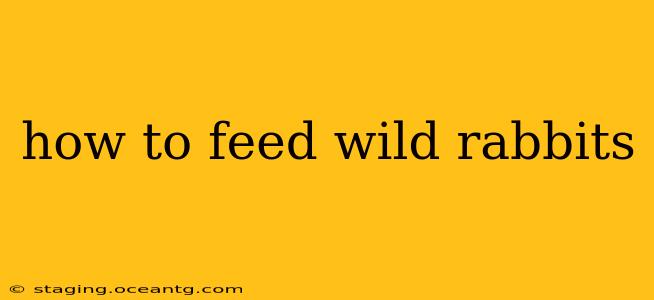Feeding wild rabbits might seem like a kind act, but it can actually be harmful to their health and the delicate balance of their ecosystem. While you might have the best intentions, providing supplemental food can disrupt their natural foraging behaviors, lead to nutritional imbalances, and even make them dependent on humans. This guide will explore the complexities of feeding wild rabbits and offer responsible alternatives to ensure their well-being.
Should I Feed Wild Rabbits?
The short answer is generally no. Wild rabbits are well-adapted to finding their own food, and human intervention can have unintended consequences. Providing food can lead to:
- Nutritional imbalances: Human food often lacks the necessary nutrients for rabbits, leading to health problems.
- Dependency: Rabbits may become reliant on human-provided food, neglecting their natural foraging skills.
- Disease transmission: Feeding from your hand or leaving out food can increase the risk of disease transmission among rabbits and potentially to humans.
- Attracting predators: Concentrations of rabbits drawn to food sources can attract predators like foxes, hawks, and owls.
- Disrupting natural behavior: Regular feeding can alter their natural behaviors, such as their search for food and their interactions with the environment.
What Do Wild Rabbits Eat Naturally?
Wild rabbits are herbivores with a diet primarily consisting of grasses, herbs, weeds, twigs, and bark. Their diet varies seasonally depending on availability. They are well-equipped to find and digest a wide variety of plant materials.
What if a Rabbit Looks Sick or Injured?
If you encounter a wild rabbit that appears sick, injured, or orphaned, do not attempt to care for it yourself. Contact your local wildlife rehabilitation center or animal control. They have the expertise and resources to provide appropriate care and treatment.
What if There's a Severe Winter or Drought?
In extreme weather conditions, such as harsh winters or prolonged droughts, food scarcity might become a concern. However, supplementing their diet should still be approached with caution. Consulting a wildlife expert or your local wildlife agency is the best course of action. They can advise on the appropriateness and methods of providing supplemental food, if necessary.
Is it Okay to Leave Out Water for Wild Rabbits?
Providing a clean water source, particularly during hot weather, is generally considered safer than providing food. A shallow dish or a bird bath can offer a reliable hydration source. Ensure it’s cleaned regularly to prevent the spread of disease.
What Foods Are Toxic to Rabbits?
Many common foods are toxic to rabbits, including chocolate, lettuce (especially iceberg), rhubarb, and certain beans. Never intentionally feed wild rabbits any human food.
How Can I Help Wild Rabbits Without Feeding Them?
Instead of providing food, you can help wild rabbits by:
- Providing a safe habitat: Maintain a rabbit-friendly environment with adequate cover and vegetation. Avoid using pesticides and herbicides.
- Supporting conservation efforts: Support organizations that work to protect rabbit habitats and populations.
- Educating others: Spread awareness about the importance of not feeding wild rabbits.
In conclusion, while the desire to help wild rabbits is commendable, feeding them directly is generally discouraged. Understanding their natural diet and the potential negative impacts of human intervention is crucial for responsible wildlife stewardship. Focus on creating and maintaining a safe and healthy habitat for these animals to thrive naturally.
